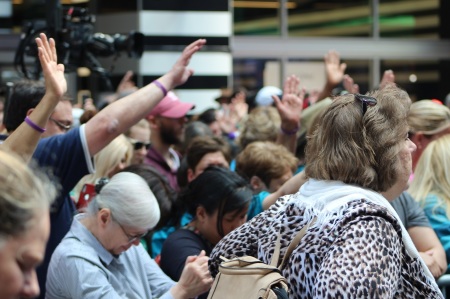Atheists believe gestures of ‘thoughts and prayers’ in hard times make them worse off, study finds

Christians who suffer during natural and human disasters value thoughts and prayers from religious strangers, while atheists and agnostics believe they are made worse off by such gestures, a new study led by a University of Wyoming economist shows.
The study, The value of thoughts and prayers, led by assistant professor Linda Thunstrom of the Department of Economics in UW’s College of Business, was published in the scientific journal Proceedings of the National Academy of Sciences last month.
Researcher Shiri Noy of Denison University in Ohio also worked on the project, which asked 482 Christian, agnostic, and atheist victims in the aftermath of Hurricane Florence in September 2018 how much they would be willing to pay for thoughts and prayers from persons with zero levels of religiosity versus priests.
The study was undertaken in an attempt to settle the debate between critics who argue that gestures of “thoughts and prayers” are meaningless and might obstruct structural reforms intended to mitigate catastrophes, and others who argue there is value in those gestures.
It was found that Christians value thoughts and prayers from religious strangers and priests, while atheists and agnostics are so “prayer averse” they would pay to avoid receiving prayers. While atheists and agnostics were shown to be indifferent to receiving thoughts from other secular people, they negatively value thoughts from Christians, the study shows.
“The net effect on recipient welfare from thoughts and prayers depends on how recipients perceive to benefit from such intercessory gestures,” Thunstrom said in a news release.
“Our results suggest that thoughts and prayers for others should ideally be employed selectively,” the researchers concluded. “While Christians value such gestures from fellow believers, nonreligious people negatively value such gestures from Christians and are indifferent to receiving them from other nonreligious people.”
The study found that Christian hurricane victims on average value prayers from a Christian stranger at $4.36 and from a priest at $7.17. Secular people, however, were willing to pay $3.54 for a Christian stranger not to pray for them and $1.66 for a priest to do the same.
Christians also valued thoughts from a religious stranger at $3.27, while nonreligious people negatively value the same gesture at -$2.02.
Thunstrom hoped the study could temper public debate on the issue and suggested more research was needed to gather the perceived value of thoughts and prayers.
“The finding that Christians benefit from intercessory prayers, while the welfare of atheists/agnostics is reduced by such gestures, underscores the divide in this popular response to hardships,” Thunstrom said.
“Our results also might reflect the political and religious polarization in the United States. We find that it matters who sends the gesture. Christians value gestures from other religious Christians, while nonreligious attach a higher value to supportive gestures from other nonreligious. A deeper understanding of the values and beliefs of different groups with respect to thoughts and prayers may, however, reduce some of the animosity surrounding thoughts and prayers in the public debate,” she added.





















